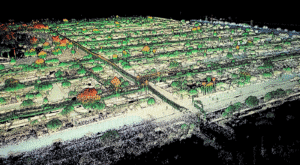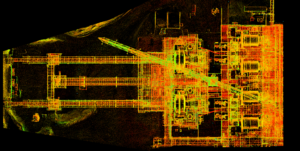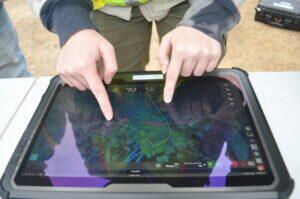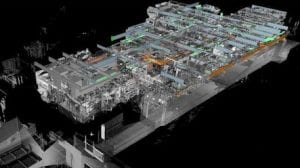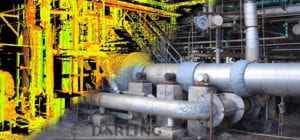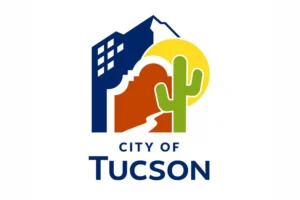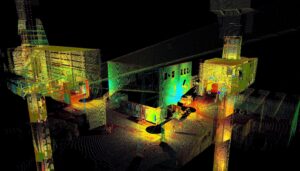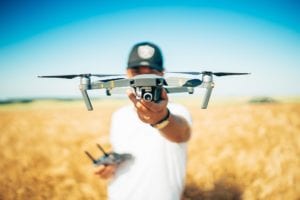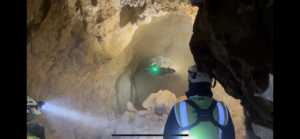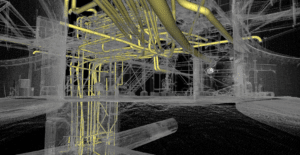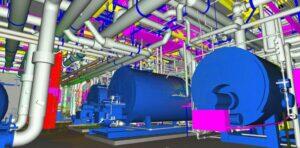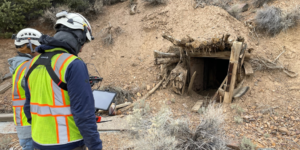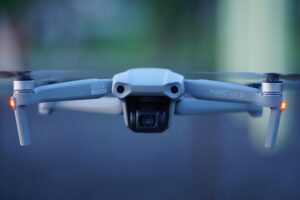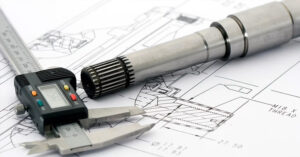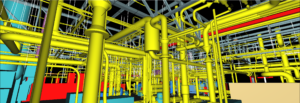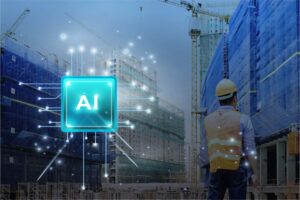Sign up for our email newsletter to receive updates on the latest in geospatial technology that will help improve your projects' efficiency, safety, and costs.
A digital twin is more than a 3D model. It’s a living, data-rich replica of a physical asset that supports real-time decision-making, predictive maintenance, and operational planning. The foundation of any useful digital twin is accurate geometry, and that’s where LiDAR scanning comes in. LiDAR (Light Detection and Ranging) captures millions of precise measurements in…
If you’ve been in manufacturing project management for more than a few months lately, you’ve probably heard someone mention reality capture or digital twins in a meeting. Maybe it was during a facility expansion discussion, or when someone was trying to solve a clash detection problem. These terms get thrown around a lot, but what…
The land surveying industry has changed dramatically over the past decade. What used to take weeks of manual fieldwork can now be accomplished in a matter of hours. Drone surveying has emerged as a game-changer for professionals who need accurate, comprehensive data without the traditional time and cost constraints. At Darling Geomatics, we’ve seen firsthand…
Construction projects rarely go exactly as planned. Regulations change, lenders impose new requirements, and municipalities demand documentation you never saw coming. Understanding when an as-built survey becomes necessary can save your project from costly delays and compliance issues. At Darling Geomatics, we see the same question repeatedly: “Do I really need an as-built survey?” The…
3D scanning has transformed the way projects are planned, designed, and built. Instead of relying on limited measurements and drawings, engineers, architects, and developers now have access to highly detailed digital models that mirror reality. At Darling Geomatics, our 3D scanning services deliver data-rich insights that help clients make smarter decisions, reduce errors, and save…
Tucson Continues to Grow Darling Geomatics is proud to announce that we have been awarded the 2025-2026 on-call land surveying contract for the City of Tucson. This award highlights our decades of experience, dedication to precision and safety, and commitment to supporting the growth and infrastructure of our community. What is an On-Call Land Surveying…
For years, the concept of a digital twin sounded futuristic: something reserved for aerospace labs or advanced manufacturing plants. But in 2025, that’s changed. Digital twin technology is rapidly becoming essential for construction sites and industrial property management. Today’s digital replicas are more than models And if you’re in the business of building, operating, or…
Drone Surveying FAQs: Everything You’ve Wanted to Ask (But Didn’t Know Who to Ask) Drone surveying is revolutionizing the world of geospatial data collection, but for many engineers, developers, and project managers, it remains a mystery. In this blog, we tackle the most frequently asked questions about drone surveying – the ones people hesitate to…
Mining has been a cornerstone of Arizona’s economy for over a century, producing copper, gold, silver, and a range of other minerals critical to industries worldwide. But behind every successful mining operation is a foundation of precise, detailed land surveying. At Darling Geomatics, we understand how crucial accurate land surveys are to the success, safety,…
If you’ve ever dipped a toe into the world of remote sensing, you’ve probably heard a lot about hyperspectral imaging and LiDAR. Both technologies are indispensable in modern geospatial work, but they’re often misunderstood or lumped together. At Darling Geomatics, we use both technologies extensively-sometimes independently, sometimes in tandem-to support everything from large-scale environmental assessments…
In recent years, the advancement of LiDAR systems and 3D scanning technology has revolutionized several industries by providing highly accurate, high-resolution data and models. LiDAR, which stands for Light Detection and Ranging, utilizes laser light to measure distances and generate detailed maps and models. As we look to the future, it’s clear that innovations in…
Let’s talk about something exciting that’s transforming the mining industry: 3D laser scanning technology. If you’re involved in mining operations, you know how crucial it is to understand both your surface and underground environments. What if I told you there’s a way to create an incredibly detailed digital model that captures everything from your surface…
The evolution of underground mapping technology has transformed how we understand and navigate complex mine networks. Through the integration of LiDAR (Light Detection and Ranging) technology, geological surveys have reached unprecedented levels of accuracy and detail, revolutionizing how we approach underground mine mapping projects. The Power of Precision Modern LiDAR systems can capture millions of…
Underground mine surveying, exploration, inspection and monitoring have become faster, safer, more efficient, and less intrusive since drone LiDAR (3D laser scanning) entered the picture. With remotely piloted drones, many of the traditional challenges faced by the mining industry have evaporated. There are many benefits to employing drone-mounted laser scanning in underground mining. For starters,…
Discover how digital twins—virtual representations of real-world objects or processes—provide risk-free environments for simulation, monitoring, and predictive capabilities across industries like construction, manufacturing, transportation, mining, and healthcare.
What AI Brings to Surveying If you thought drones were an exciting advancement in surveying, hold on to your hats-AI is upping the capabilities of both data capture and processing. Driving greater precision and greater analytic capability, and more informed decision making, the application of AI has changed geospatial engineering forever. Automated drones can capture…
What would you say to implementing metrology technology that could: Boost precision? Enable better quality control and consistency? Provide continuous monitoring capable of responding immediately to abnormalities? Bring more data to uncertainty analysis? Automate inspections? Offer predictive analytics that anticipate machinery breakdowns before they cause costly repairs, replacement and downtime? Extend the life of your…
Digital twins are not new, but their potential has grown by leaps and bounds with the application of machine learning. Employing AI to digital twins to facilitate smart manufacturing was always just a matter of time; now that future is here. Digital twins-virtual reproductions of physical objects, processes or entire complex systems, such as a…
Digital surface models (DSMs) are nothing new, but as software and scanning equipment have become more sophisticated so have DSM’s. Digital terrain maps have many engineering applications, of course. but other sectors, such as agriculture, energy, and conservation, are finding uses for them as well. When you add AI to the mix, however, the capabilities…
Mine surveyors perform essential services. The data they glean helps plan work, make decisions, improve safety, and aid in mineral exploration. But ground-based surveying methods and manual calculation leave a lot to be desired. Slow and subject to human error, traditional mine surveys can take days or weeks. Traditional surveying often puts surveyors at risk.…
Sign up for our email newsletter to receive updates on the latest in engineering technology that will help improve your projects' efficiency, safety, and costs.

